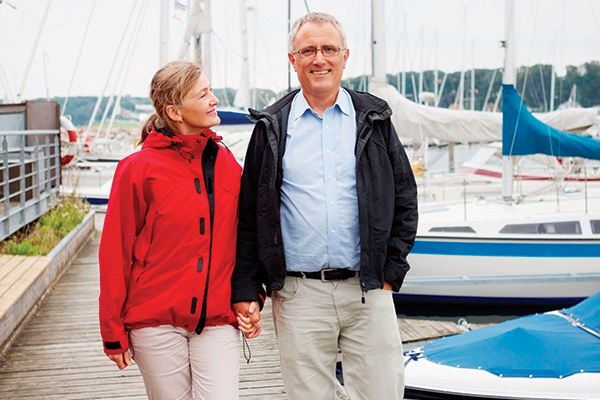Ready for Retirement?
For cancer survivors, a retirement plan can ensure that you are financially and emotionally prepared.
by Carolyn Messner, DSW, MSW, ACSW, BCD, LCSW-R, and Enrique Silva, BS, M.ARCH NCIDQ, LEED AP
For cancer survivors, the transition from working to retirement is full of challenges and opportunities. The average American retiring at age 65 can expect to spend 18 years in retirement. When planning for retirement, there are two important areas to consider: managing your finances and managing your time.
Managing Your Finances
Estimating income and resources is essential in retirement. Today’s pre-retirees say they will need to postpone their retirement 4.2 years on average. The uninsured costs of healthcare are the biggest financial unknown in retirement. Medicare provides partial health insurance coverage to people who are 65 and over or who meet other special criteria. Many retirees purchase supplemental insurance from a private company or apply for federal, state, or local entitlement programs to pay for costs not covered by Medicare.
During retirement, there are certain expenses that may decrease. These include work-related costs, such as commuting, parking, lunches, business clothing, and dry cleaning; income taxes; and home maintenance costs for tasks you will now do yourself instead of hiring someone. There are also certain expenses that may increase, including recreational and social activities, travel, health insurance, healthcare, and prescriptions.
Managing Your Time
Many people give little thought to how they will spend their time in retirement. While some retirees report a honeymoon-like period for the first six to nine months of retirement, many experience an eventual urge to become more productive in retirement than they had anticipated.
It’s important to determine what you want out of retirement. Think about your personality. If you’re the type of person who loves alone time, then books, newspapers, and TV may bring you contentment. However, extroverts are more likely to enjoy and need activities involving others.
Part-Time Work
Some retirees may have achieved financial independence and have no fiscal need to work. Others may find that a few hours of work increases their financial security, stability, and well-being. Those not needing income might find that their life satisfaction increases by being around others in the workplace, particularly if the job has less stress and responsibilities than it did during their working years. More retirees are pursuing “encore careers,” which enable them to choose work they may have always wanted to do but could not pursue due to other obligations.
Volunteering
Volunteer work not only fills the day but also creates meaning and purpose. It enables you to utilize the skills and talents honed throughout your career for the benefit of others.
Exercise
Exerting yourself physically and mentally helps keep you fit. Engaging in conversations, solving puzzles, and playing board games keep your mind active.
Group Hobbies
Make time to enjoy a hobby in the company of others. Share your time with like-minded people, many of whom may become friends. This is important. You have spent your working life in the company of others. Apart from a few close co-workers who have become friends, you may lose this network once you retire. It’s important to replace this form of social interaction with another so that you don’t become isolated in your retirement.
Your Retirement To-Do List
- Find out how much your social
Security benefit is expected to be
by calling (800) 772-1213 or by
visiting ssa.gov. - If you have a pension, ask your
employer for a benefits estimate. - Discuss with your spouse or life
partner the type of retirement you
want and how to achieve it.
Solo Hobbies
Consider leisure time by yourself to allow you to reflect and contemplate things. Find something you want to do on your own.
Socializing
You should also find time to arrange regular get-togethers for dinner, movies, cultural and sporting events, civic interests, and faith-based activities with your family, grandchildren, and close friends. Maintaining meaningful long-term relationships when you retire is important.
Learning New Skills
When you retire, you may want to learn new skills or obtain additional knowledge. Whether it’s a day or evening course at a college or teaching yourself how to play the piano, learning something new is rewarding and helps boost your self-esteem.
Travel
Traveling is an invigorating way of spending your time and experiencing different cultures, lifestyles, and geography. With a little planning, you can enjoy your retirement years worry-free.

Dr. Carolyn Messner is director of Education and Training at CancerCare and
past-president of the Association of Oncology Social Work.

Enrique Silva is a volunteer in the Education department at CancerCare.
This article was published in Coping® with Cancer magazine, September/October 2011.


